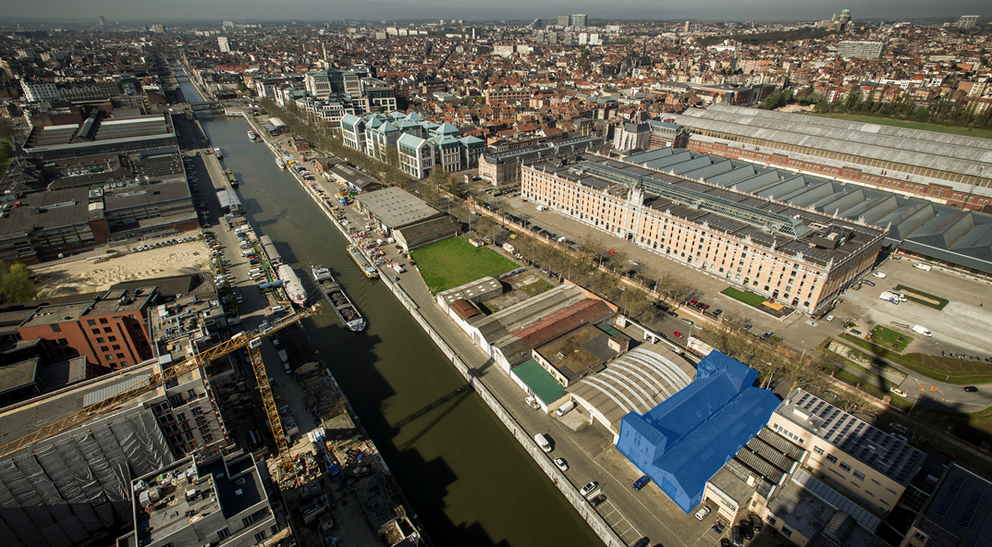SAU seeks multidisciplinary team to design integrated support centre for drug users
The Urban Development Corporation (SAU) has published a European public procurement notice with a view to appointing a multidisciplinary team to design and oversee the construction of an integrated centre for vulnerable drug users. The Brussels Region has tasked the SAU with constructing the centre at 55 Avenue du Port, next to the headquarters of the Port of Brussels, which will also have premises in the future building.
The new construction project (following the demolition of two disused buildings: see photo) will have an approximate total floor space of 5,000 m²: just over 4,000 m² for the integrated centre and nearly 1,000 m² for the Port. The selection procedure will be conducted in two phases. In the selection phase, the SAU will shortlist no more than three to five candidates, who will be asked to submit a bid. In the award phase, the SAU will pick the successful candidate on the basis of the detailed bids (project outlines).
Throughout the project, the SAU, acting as contracting authority on behalf of the Region, will work closely with Brussels Prevention and Security, which is providing 12.3 million euros of funding, the Port of Brussels, which granted a lease on the land adjoining its headquarters to the Region, the Regional Land Management Agency, the team of the Region’s Chief Architect and the non-profit organisation Transit asbl.
The Region plans to open the integrated centre for vulnerable drug users in 2025.
The public procurement notice is available at www.publicprocurement.be.
A tangible achievement of the General Security and Prevention Plan
The publication of this public procurement notice at European level follows the Regional Government’s decision of 12 December 2019 to set aside the budget necessary for the operation, on the proposal of Minister-President Rudi VERVOORT and Minister Alain MARON.
Minister-President Rudi VERVOORT, whose areas of responsibility include security, emphasises that ‘this integrated centre for vulnerable drug users will be a major achievement of the Region’s General Security and Prevention Plan’. Specifically, he explains, ‘it will be an “integrated centre with a very low threshold”: this means, first, that it will accept drug users unconditionally and anonymously, and will offer free services and 24/7 reception, with specific facilities for women, and second, that it will enable different services and approaches to be combined, including reception, care, psychosocial work, accommodation and socio-professional integration. The aim is for it to become a genuine centre of expertise in addiction which also supports research and social innovation in health.’
Rudi Vervoort points out that ‘this project is explicitly mentioned in the 2019-2024 Majority Agreement, in the chapter on “Ensuring access to health and combating inequalities”, paragraph 3, “Universal access to health care”. The government has undertaken to implement a proper risk reduction policy for potential consumers or users of drugs (including alcohol). With this in mind, the government will support the creation of supervised drug consumption facilities through this new integrated centre to be operated by the non-profit organisation Transit asbl.’
Regional coordination
Alain MARON, Minister for Health and Social Action who also oversees the Port of Brussels, explains that ‘this project serves a twofold function: societal and urban. It will allow the Port of Brussels to redeploy its services more effectively at its historic site. It is also a further example of the striking of a new urban balance, in that it will optimise the use of the available land, improve the quality of public spaces and reinforce functional diversity.’
Gilles DELFORGE, the SAU’s director, welcomes the fact that ‘the SAU can once again play its role as coordinator of Brussels' development on behalf of the Region's authorities. The SAU is leading the implementation of major urban development projects and the creation of a very wide range of public facilities of regional significance. This future integrated centre for drug users confirms the versatility of the SAU which, in addition to its role in housing, is also coordinating projects relating to facilities in areas such as culture, the media, emergency services, sport, academia and nautical activities. As always, the SAU’s role consists of coordinating the actions of the various partners concerned in close consultation with them.’
- (*) Comprehensive project design contract for a multidisciplinary team (architecture, stability, building services engineering, environmental and sustainability expertise and energy performance coordination, safety and health coordination, acoustics, BIM).

